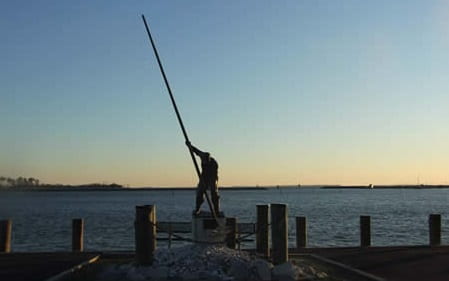INSEAD alumni join forces with Social Innovation Centre on high-impact case study
When a massive tsunami slammed into Japan’s Tokoku region in March 2011, the humanitarian toll was enormous. Nearly 20,000 people died, some 6,000 were injured and 2,500 reported missing. More than 300,000 homes were destroyed and 100,000 children were displaced as a result of the level 9.0 undersea earthquake that pushed a wall of water up as high as 40 metres in some places. The sea surge leveled everything in its path.
To compound the human tragedy, the natural disaster caused meltdowns in three nuclear reactors in the Fukushima Daiichi complex and decimated the local economy, one significantly dependent on commercial fishing and oyster farming. The tsunami destroyed an estimated 90% of all fishing boats and 95% of the oyster farms in the Miyago Prefecture. Oyster sales from the region plummeted by 20%. The World Bank tallied the economic cost at US$235 billion, an unprecedented amount for this kind of calamity.
In the event’s aftermath, INSEAD alumni, including Robert Verdier, MBA ‘87J, sought ways to help. That assistance took both immediate and long-term forms. Verdier, a French native who had lived and worked in Japan for three decades as a banker, entrepreneur and philanthropist, led an early effort to get much-needed winter clothing—some 15 tons—to those impacted by the tsunami. Noted French economist, Jacques Attali, had recruited Verdier in 2009 to serve as the volunteer head in Japan for PlaNet Finance, an international microfinance NGO. Now Verdier’s mission assumed far greater urgency.

To help restore the region’s economic stability, Verdier and others—including French manufacturer Patrice Mulot, commercial advisor Etienne Rolland Piegue, and financier Frank Dargent—explored ways to secure disaster-remediation funds. Their outreach spurred collaboration with Fondation de France, an independent global aid group based in Paris, as well as PlaNet Finance. Verdier convinced an old business friend, Kazuo Tanaka, to take the reins as PlaNet Finance Executive Director, a challenging role given microfinance’s limited historical profile in Japan.
The group decided to focus on reviving the oyster industry, a decision in part inspired by history. In the 1970s and 1990s, French oyster farms had suffered a viral epidemic that dramatically reduced their seafood stocks. On both of those occasions, it had been Japan that provided the oyster seed to restore the European farms. Now, Verdier and the others were calling their 2011 initiative “France O-Kaeshi”—literally “France returns the gift,” suggesting repayment of a debt. To succeed, though, the group had to navigate challenging philanthropic and legal considerations, as well as logistical hurdles.
With the assistance of the French embassy, PlaNet Finance applied for a €200,000 grant from Fondation de France. They soon realized, though, that by the time they received any money it would be far too late to help farmers with the start of the oyster-growing season in July.
To deliver the materials in time, PlaNet Finance turned to companies like French seafood producer S.A.S. Mulot and logistics firm SDV. They also received money from the chamber of commerce of Rochefort, France’s main oyster-producing region.
In early July, they sent seven tons of ropes and buoys to Kesennuma and Higashimatsushima in Miyagi Prefecture, just in time for the start of the oyster-producing season. “It was a race against the clock,” says Verdier. When the equipment was delivered, he recalls, “people were crying and saying ‘thank you France.’”
Today, oyster harvests in the affected area remain greatly depleted, only about 15% of what they were prior to the tsunami. But the expectation is that harvests will rise to 40% of pre-catastrophe levels over the next three years.
Turning tragedy into thought leadership
In addition to the efforts undertaken by Verdier and others, INSEAD alumni, faculty and corporate friends have joined forces to document the group’s humanitarian project in a newly published case study, titled “France O-Kaeshi.” Robert Crawford, associated with the INSEAD Social Innovation Centre, wrote the case under the supervision of Luk Van Wassenhove, Academic Director, Humanitarian Research Group, and The Henry Ford Chaired Professor of Manufacturing, Professor of Operations Management.
Crowd-sourced contributions, in part, financed the case project. Significant donations came from the Mitsubishi Corporation, SDV Japan, the INSEAD Alumni Association Japan, and several alumni, including: Yoshihiko Abe, Go Denda, Yuji Ito, Satoshi Koyama, Hiroki Kudo, Rio Li, Ichiro Miyoshi, Junko Mori, Tsunehiro Nakayama, Eric Nishimura, Jun Shibata, James So, Ricardo Sousa, Ryoichi Ueda, Robert Verdier and Egbert William.
“This project is an excellent example of intellectual engagement among INSEAD alumni, faculty and corporate friends,” said Professor Van Wassenhove. “The case illustrate the role and responsibility of business in our society, as well as INSEAD’s dedication to bringing together theory and practice to deliver tangible results by developing innovative business models. As a collaboration extending from Asia to Europe, the case also is a showcase for our school’s unique global influence.”
The initiative’s humanitarian impact is just one part of the project’s success, according to Verdier. There is another, equally ambitious aspect that aims to “change the paradigm” of oyster farming in Japan. Verdier explains that, prior to the tsunami, 97% of the oysters farmed in Japan were sold as oyster meat in Japanese supermarkets. In resuscitating the farms, though, the team introduced a proposal that the farmers transition, in part, to a model that creates a more profitable, value-added product: whole oysters. A large raw oyster in a Tokyo oyster bar can command ¥500, compared with about ¥250 for a pack of six or seven shell-less oysters in a supermarket.
“If we succeed in changing the business model,” says Verdier, “the outcome will be more profitable for the farmers and the oysters will be of better quality.”
Regardless, the thought leadership and compassion of the INSEAD global network has already made a significant impact in restoring a vital part of Japan’s oyster farming industry.
And the business lessons shared through the “France O-Kaeshi” case will provide much food for thought, too. This INSEAD case, published under the Social Innovation Centre’s aegis, offers lasting humanitarian logistics insights for scholars and practitioners worldwide.
Read the full case study.
Learn more about INSEAD’s Social Innovation Centre which developed the case study.
Read the latest issue of the INSEAD Social Innovation newsletter.


